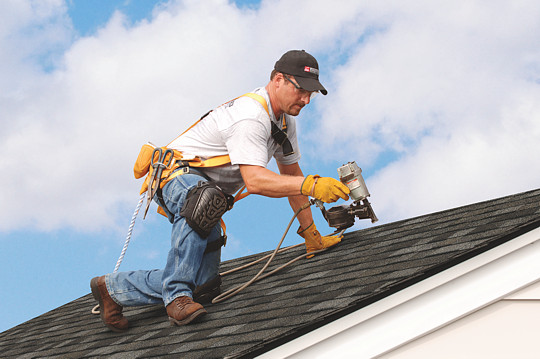Texas Roofer Bonding Insurance Explained
September 04, 2024
by admin

Key Highlights
- Protection for Homeowners: Bonding insurance safeguards homeowners from financial losses if a roofing contractor fails to complete a project or meet contractual obligations.
- Ensuring Contractor Accountability: It holds roofing contractors in Texas accountable for their work, ensuring projects are completed as agreed.
- Licensing Requirement: In vielen Fällen ist eine Bürgschaftsversicherung für Dachdecker obligatorisch, um in Texas eine Lizenz zu erhalten, was auf Vertrauenswürdigkeit und Professionalität hindeutet.
- Financial Security: Bietet finanzielle Entschädigung, wenn ein Dachdecker aufgrund von Vertragsverletzungen oder mangelhafter Ausführung Schäden oder Verluste erleidet.
- Peace of Mind for Clients: Die Auswahl eines gebundenen Dachdeckers gibt Hausbesitzern die Gewissheit, dass ein Sicherheitsnetz vorhanden ist, falls Probleme auftreten.
Introduction
When you hire a roofing contractor in Texas, you might look at their experience and costs first. But it’s very important to check if the roofer has the right insurance coverage, like general liability insurance and a surety bond. General liability insurance helps protect you from claims made by others. A surety bond gives you extra security as a homeowner. This article will help you understand bonding insurance for Texas roofers. It will explain why it matters and how homeowners can benefit from it.
Understanding Bonding Insurance for Texas Roofers
Bonding insurance, known as a surety bond, is very important in the roofing industry in Texas. It is a contract between three parties: the roofing contractor (called the principal), the homeowner (known as the obligee), and the surety company. This surety bond acts like a promise from the surety company to the homeowner. It offers financial protection if the roofing contractor does not meet the contract terms.
This type of insurance is different from general liability insurance. General liability insurance usually covers claims from other people for property damage or injuries. Bonding insurance, on the other hand, focuses on making sure the project gets finished and that everyone sticks to their agreements. In Texas, it is key to understand bonding insurance due to the state’s weather and the risks that can come with roofing projects.
Defining Bonding Insurance in the Roofing Industry
Bonding insurance is more than just a type of insurance policy. It builds trust and ensures accountability in the roofing industry. When roofing companies have bonding insurance, it shows they are serious about following industry standards and meeting their commitments to clients. This also helps them stand out from competitors who may not provide the same level of financial protection.
In Texas, a roofer license bond is often needed to get a roofing license. This bond helps protect homeowners by confirming that the roofer is qualified and follows all the rules for licensing. With a roofer license bond, homeowners can trust that their contractor works legally and ethically.
In short, bonding insurance acts like a safety net. It connects what a roofing contractor promises to what they actually deliver. This showcases their professionalism. It gives peace of mind to both homeowners and the roofing companies they hire.
The Importance of Bonding Insurance for Roofers in Texas
Under the changing Texas weather, roofing projects need extra security. That’s why bonding insurance is very important. For roofers in Texas, it is not just about their safety. It also helps homeowners feel secure, knowing their investment is protected.
If a contractor does not finish a project or causes property damage from poor work, the surety bond can help. This coverage can pay for things like having another contractor finish the job, for materials, or even for any damage caused by the first contractor’s mistakes.
In the end, bonding insurance helps build trust between homeowners and roofing contractors. It makes sure everyone is responsible, encourages better work quality, and provides financial help if problems come up. In the fast-moving Texas roofing market, this insurance is key for knowing which contractors are good and dependable.
How Can I Tell If My Roofer Is Bonded?
Having bonding insurance with your roofer is a smart way to protect your roofing investment. A good roofing contractor should easily show you proof of their bonding insurance when you ask. Don’t be afraid to ask about it and request a copy of their bond certificate.
If you have questions or concerns, you can contact the Texas Department of Insurance. They can check if the bond is valid and give you more details. You can also find useful information about roofing contractors, including their licensing and bonding status, in online document libraries run by professional groups or government offices.
Why Do Homeowners Care About Their Roofer’s General Liability Insurance?
Bonding insurance helps protect homeowners if a roofer does not finish a job. General liability insurance is another important kind of protection in roofing work. This type of insurance helps homeowners if a roofer causes property damage or injuries by mistake while working.
Think about a roofer who drops a heavy tool. This could ruin your property or even hurt someone. Without general liability insurance, the homeowner might have to pay for the damages. This coverage gives you peace of mind. It means you won’t have to worry about surprise costs or legal issues from accidents during the roofing work.
Do Roofers Have to Buy General Liability Insurance?
While roofers in Texas do not have to have general liability insurance by law, it is still very important for running a good business. Working without this insurance can put roofers and their clients at great risk. Accidents can happen, and they might bring big financial problems.
Even small problems, like a ladder hitting a gutter or something falling on a neighbor’s property, can result in expensive claims. If a roofer doesn’t have general liability coverage, they could be responsible for paying these costs and any legal fees that might arise.
Clients often prefer to work with contractors who are insured. Having general liability insurance not only helps reduce risks but also improves a roofer’s reputation. It makes them look like responsible and trustworthy workers.
How Much General Liability Insurance Do You Need?
Determining appropriate liability coverage is crucial for roofing contractors in Texas, and understanding the factors influencing coverage limits is vital for selecting the right policy. Several variables come into play, including the size and scope of projects, revenue, and the perceived risk associated with the type of roofing work undertaken.
Here’s a general guideline for roofing contractors:
|
Coverage Type |
Recommended Minimum Coverage |
|
General Liability |
$1 million per occurrence / $2 million aggregate |
|
Commercial Auto Insurance |
$1 million Combined Single Limit (CSL) |
|
Worker’s Compensation |
$500,000/$500,000/$500,000 |
Keep in mind; these are just minimum recommendations. It’s always advisable to consult with an experienced insurance professional to determine the adequate coverage limits for your specific roofing business. They can assess your unique needs and advise accordingly.
Conclusion
In conclusion, knowing about bonding insurance is important for both Texas roofers and homeowners. It gives financial protection and helps you feel secure in the roofing industry. If you are a roofer, this information can help you gain trust from your clients. If you are a homeowner, it offers something to rely on. Make sure your roofer is bonded and ask about their general liability insurance to protect your interests. By staying informed about these things, you can have a safe and reliable roofing experience. If you have more questions about bonding insurance for Texas roofers, check our FAQs section for more details.
Frequently Asked Questions
What is bonding insurance for a roofer in Texas and why is it important?
Bonding insurance for roofers in Texas, which is usually a surety bond, gives homeowners peace of mind. It offers insurance coverage and financial compensation if the roofing contractor does not finish the roofing job as stated in the contract.
What is the difference between bonding and insurance for roofers?
A surety bond helps protect the homeowner if a general contractor does not meet the terms of the contract. On the other hand, a general liability insurance policy generally deals with claims from third parties for injuries or damage to property.
Is My Roofer Bonded?
You can find out if a roofer is bonded. Just ask them for proof of their surety bond. You can check with the bonding company or see their roofer license status. You could also reach out to an insurance professional. Additionally, always ask for certificates of insurance.
What If A Roofer Isn’t Bonded?
If a roofing contractor is not bonded, homeowners take on more financial risks. They could end up paying for incomplete work, damage to their property, or even legal costs. They would have to handle these expenses without help from compensation insurance.
Who Needs a Roofing Contractor License Bond?
In Texas, most roofing contractors must have a Roofing Contractor License Bond to get their contractor license. This license allows them to do residential work, like putting on a new roof. The cost of the surety bond will vary based on the insurance company.



